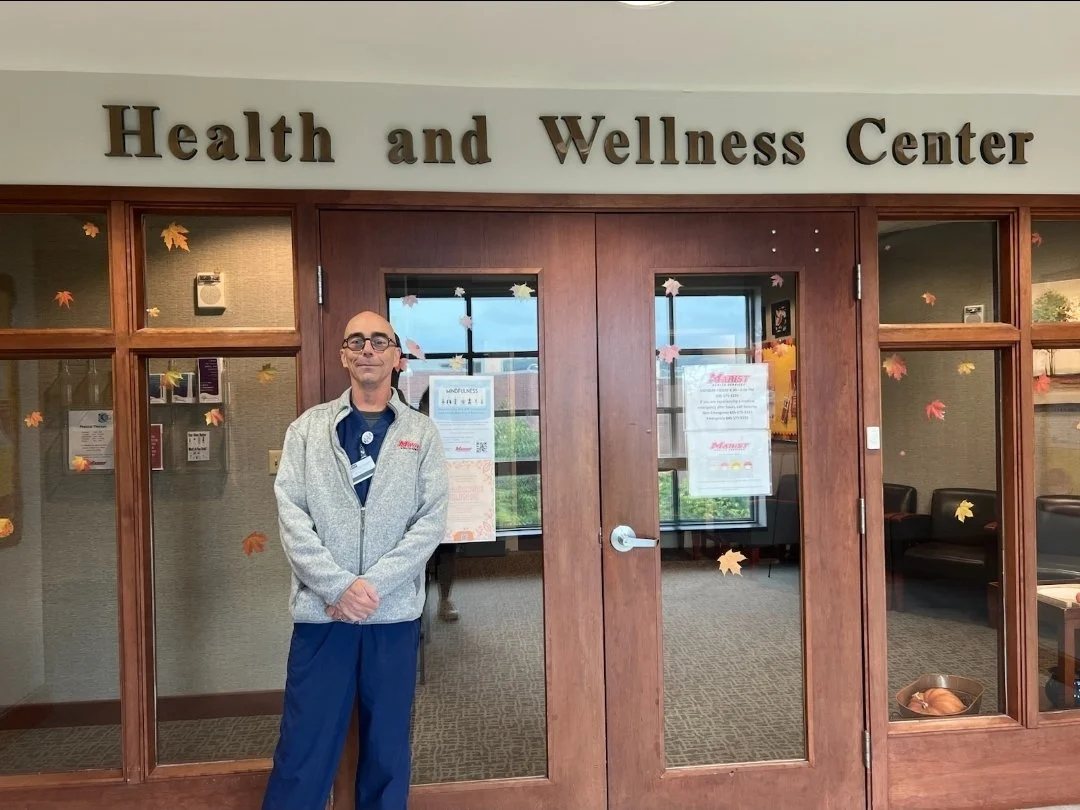Health Services to Offer Four-Week Intro to Mindfulness Course
Allan Tibbetts, a registered nurse and instructor of the Intro to Mindfulness course, poses outside the Health Services Office. Stephanie Moyle '26
Under the instruction of Allan Tibbetts, a registered nurse and Zen Buddhist priest, Marist Health Services will be offering a four-week Intro to Mindfulness class beginning in October.
“College is a little bit like an ICU. For you as a student, things can feel really intense,” Tibbetts said. “Whether you have social anxiety, or if you have test-taking anxiety, or you’re feeling profoundly worried about the future, we’re giving you ways to stay grounded in the present moment… We are giving you the skills to be more responsive and less reactive.”
Intro to Mindfulness is an evidence-based course developed by the Mindfulness Institute for Emerging Adults (MIEA). It focuses on helping students improve calmness and overall well-being, decrease anxiety, promote self-awareness and remain grounded through the ever-turbulent young adult years.
The course was created with individuals ages 18 to 26 in mind and incorporates mindfulness activities like belly breathing, body scans, guided meditations, pranayama (breath technique), gratitude practice and walking meditation.
“It’s really a period of time where mindfulness practice, if embraced and done regularly, can be life-changing,” Tibbetts said.
The program is highly experiential, allowing students to practice two mindfulness techniques per class. Afterwards, they can access more information, techniques and resources on the free MIEA app and communicate with their classmates and instructor online, building a “garden of mindfulness,” as Tibbetts described. There, they also anonymously start each mindfulness session with two things they are grateful for— a newer aspect of the app that Tibbetts has grown to appreciate because of how it builds community and reframes students’ initial approach to gratitude.
This approach to integrating mindfulness into the everyday lives of students has been the most successful this year, as the class is filled with 12 students when previous years have only seen four to five participants. In regards to previous attempts to introduce students to mindfulness, Tibbetts referred to alternate methods as “the wrong dose of meditation.”
“I always kind of refer to this as medicine… It wasn’t the right way of approaching it,” he said.
With a background in various types of nursing, Tibbetts is combining his plethora of knowledge with what he knows to be true about the benefits of mindfulness and meditation from a secular standpoint for individuals at this stage of life.
Practicing mindfulness every day allows individuals to become comfortable with the potentially uncomfortable feelings that it brings. Remaining grounded in practice even as the mind starts to wander allows practitioners to then remain grounded in other situations, ranging in seriousness from eating a meal to a tragic event.
“It’s about learning how to build that mindfulness muscle… Ten minutes of practice a day is like having teeny tiny weights on top of your mind,” Tibbetts said. “Every time you notice your mind has wandered away from your breath and you invite your attention back to the awareness of your breath, it’s like doing a curl. Then, when some horrible event happens and it’s a big, heavy weight, you’ve done a few reps… You can be present in your response.”
